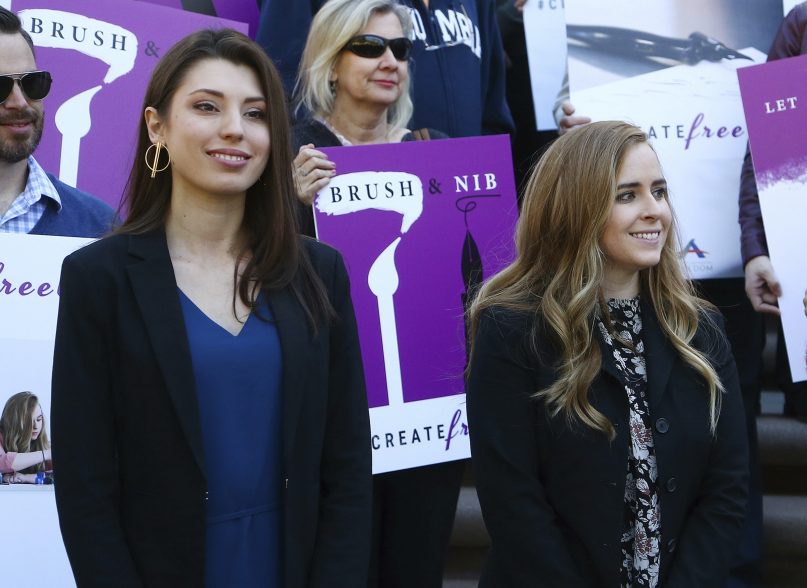(RNS) — Another skirmish in the national war over religious liberty ended last week, when the Arizona Supreme Court awarded two Christian commercial artists a partial exemption from Phoenix’s anti-discrimination ordinance.
In an opinion column published by Religion News Service on Saturday (Sept. 21), the two artists, Joanna Duka and Breanna Koski, claim that the ruling means that the city “cannot compel us to imagine and create custom artwork that violates our beliefs.”
Actually, that’s not the case.
What the court ruled, in a narrow 4-3 decision, was that Duka and Koski cannot be compelled to make wedding invitations with words or symbols that, in the court’s view, signify their approval of (in this case) same-sex marriage. Which is to say, they don’t have to make invitations if these include the names of the couple and request the honor of the recipient’s presence, with maybe a rainbow flag on the side.
That’s a far cry from the wide-ranging exemption that the Alliance Defending Freedom, the legal advocacy outfit that represented them, was asking for.
The court made a point of not providing Duka and Koski’s business, Brush & Nib Studio, with “a blanket exemption” from an ordinance that bars discrimination because of, among other things, “sexual orientation” and “gender identity or expression.” And it declined to provide an exemption for “other wedding products,” such as custom-designed save-the-date notices, menus, table numbers and welcome signs.
Its limited exemption was based on the idea that the words and/or symbols on an invitation would violate the Arizona Constitution’s equivalent of the First Amendment’s ban on “compelled speech.” But if a same-sex couple asks them to design any of those other wedding products, Duka and Koski will be compelled to “imagine and create custom artwork” that violates their belief that marriage is only between a man and a woman.
Under the ruling, then, not only Brush & Nibs but also florists, photographers and (to a certain extent) bakers in Phoenix remain subject to the ordinance’s requirement that they do custom work for same-sex weddings. Further litigation on this matter can therefore be safely predicted in the Arizona courts.
It’s likewise a safe bet that comparable litigation will take place around the country until the U.S. Supreme Court determines the extent to which businesses can use religious belief to gain exemptions from anti-discrimination laws. Given the court’s current line-up, I’d say it’s likely that some exemptions will be granted, and that when they are, they won’t just be for those who believe that God forbids same-sex marriage.
Under the Establishment Clause, courts cannot base their decisions on whether a religious belief is right, only on whether it is sincerely held. Thus, according to the Arizona ruling, if Duka and Koski sincerely come to believe that God forbids race mixing, they will be able to refuse to create a wedding invitation for a mixed-race couple.
A few weeks ago in Booneville, Mississippi, the owner of a wedding facility was caught on video telling the sister of a black man interested in arranging a wedding with his white fianceé, “First of all, we don’t do gay weddings or mixed race, because of our Christian race — I mean, our Christian belief.”
After the video went viral and the story was picked up by the news media, the owner, reportedly consulting her Bible and her pastor, did an abrupt about-face, allowing as how in fact the Bible does not condemn mixed-race marriage.
In the meantime, an announcement was posted on Booneville’s Facebook page announcing that the city, its mayor and its aldermen “do not discriminate on the basis of race, religion, gender, age, national origin, disability, marital status, sexual orientation, or military status,” and that they “do not condone or approve these types of discriminatory policies.”
Equal treatment based on gender orientation has not reached the same level of acceptance in American society as equal treatment based on race, but it’s getting there fast. In pursuing exemptions from anti-discrimination laws, conservative religious leaders and their consiglieri are fighting a rearguard action in a losing cause. If this is the hill they want to die on, so be it.






